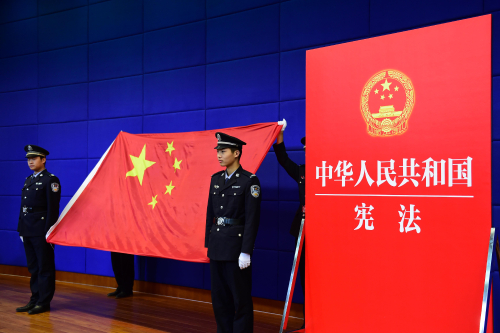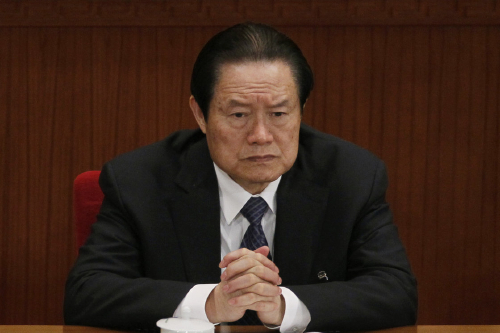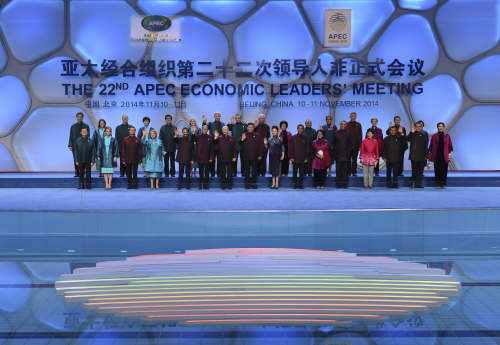|
 |
|
Staff members of the People's Procuratorate of Shandong Province take oath on December 4 on the occasion of China's first Constitution Day (GUO XULEI) |
Advancing the Rule of Law
The Fourth Plenary Session of the 18th Central Committee of the Communist Party of China (CPC) was held in Beijing on October 20-23. The rule of law topped the meeting's agenda.
This was the first time a plenary session of the CPC Central Committee has taken the rule of law as its central theme. China will strengthen its efforts in building a law-abiding government, and will ensure the leadership of the CPC in the socialist rule of law with Chinese characteristics. It also pledged to rule the country in accordance with the Constitution.
To enhance social awareness of the Constitution, the plenary meeting also decided to designate December 4 as China's Constitution Day. The decision was then ratified during a bi-monthly session of the Standing Committee of the National People's Congress (NPC) that ran from October 27 to November 1.
 |
|
Zhou Yongkang (FILE) |
Anti-Corruption Efforts Intensify
The 18th Central Commission for Discipline Inspection (CCDI) of the CPC held its fourth plenary session in Beijing on October 25, vowing to further enhance its anti-graft campaign and to support the rule of law.
Ahead of the meeting, Wang Qishan, a member of the Standing Committee of the Political Bureau of the CPC Central Committee and head of the CCDI, said China's fight against deeply engrained corruption will never end but requires "consistency, intensified supervision, discipline and accountability."
Since President Xi Jinping launched the campaign against corruption upon assuming office in 2012, a series of corrupt senior officials have been revealed and detained. In 2014 alone, more than 40 provincial or higher level officials were nailed for graft and associated crimes, including former domestic security chief Zhou Yongkang, former military leader Xu Caihou and former senior political advisor Su Rong.
Meanwhile, anti-corruption authorities also attached as much importance to the fight against fugitive officials who fled overseas. In July, China launched its Fox Hunt 2014 campaign targeting corrupt officials and suspects in economic crimes who have fled the country, and gave criminals a deadline to turn themselves in before December 1. By the end of November, Chinese police had seized 428 fugitives from 60 countries and regions, 231 of whom turned themselves in. Furthermore, China has also signed extradition treaties with 40 countries and regions, and has also signed mutual legal assistance treaties with 49 countries and regions.
 |
|
Chinese President Xi Jinping and his wife Peng Liyuan pose for a group photo with participants of the 22nd APEC Economic Leaders' Meeting and their spouses in Beijing on November 10 (MA ZHANCHENG) |
Enhancing Cooperation
The 22nd Asia-Pacific Economic Cooperation (APEC) Economic Leaders' Meeting was held in Beijing on November 11-12.
The meeting yielded tangible results with the launch of the process toward the Free Trade Area of the Asia-Pacific (FTAAP). The meeting also promoted innovation, reforms and growth to seek new momentum for the Asia-Pacific's long-term development and blueprinted comprehensive connectivity in the region.
The Beijing Roadmap for APEC's Contribution to the Realization of the FTAAP endorsed at the meeting has become a milestone in the history of the bloc and will move the region toward economic integration.
Against the backdrop of stalled WTO multilateral trade negotiations and complicated regional trade environments, the FTAAP is expected to become a paradigm of global free trade, which can change the economic landscape of not only the Asia-Pacific but also the world.
| 